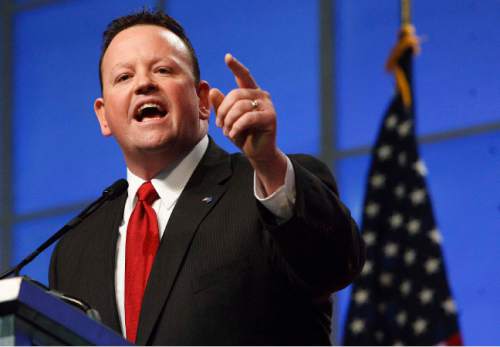This is an archived article that was published on sltrib.com in 2015, and information in the article may be outdated. It is provided only for personal research purposes and may not be reprinted.
Utah Mormons and Republicans, two groups that overlap to a large extent, tend to think the LDS Church wields the right amount of influence on state politics, according to a new poll.
But those in the minority — say, Democrats or Catholics — are likely to believe The Church of Jesus Christ of Latter-day Saints has too much clout.
The survey, conducted by Dan Jones on behalf of UtahPolicy.com, is a reaction to former state Rep. Carl Wimmer, who set off a major debate in March by saying the LDS Church bullied Mormon lawmakers on hot-button topics such as immigration and alcohol policy.
Wimmer, who recently left the LDS Church to become an evangelical Christian, decided to speak out because he believed the faith browbeat lawmakers earlier this year on a proposal to protect gay and lesbian residents from workplace and housing discrimination. That bill, which also provides safeguards for religious groups, is now law.
Wimmer said he wasn't speaking out in anger against his former faith, and he argued that he didn't bring it up before because it would have been "political suicide."
The Salt Lake Tribune contacted a dozen current and former state lawmakers, and most of them said they never witnessed any strong-arm tactics by LDS Church lobbyists.
"I view the LDS Church in the political context as the same as any other interested observer that wants to make their position known," said state Sen. Curt Bramble, R-Provo, who is among the more than 80 percent of Utah lawmakers who are Mormon.
It appears that much of the public holds the same view.
Jones polled 601 registered voters in the first week of April and found that 51 percent said the LDS Church had "the right amount of influence" on the Legislature, while 34 percent believed it had too much, 10 percent reported it didn't have enough influence and 5 percent didn't know.
Major differences appear when the results are broken down by political party and religious affiliation.
Only 15 percent of Utah's Republicans said the LDS Church had too much influence. That number shot up to 70 percent among Democrats and 48 percent among independents.
The numbers were also high among respondents who were not Mormon, with 79 percent of Catholics, 84 percent of Protestants, 85 percent from other faiths and 80 percent of people who are not religious saying the state's predominant faith group has too much political power.
And even among LDS respondents, opinions changed depending on the level of religious fervor. Only 5 percent of "very active" Mormons thought their church had too much political influence, while 26 percent of "somewhat active" Latter-day Saints did. That figure jumped to 49 percent of members who are "no longer active."
Wimmer, who is out of politics and working as a police officer in Gunnison, is a conservative, and he doesn't like the new LGBT nondiscrimination law, SB296, nor the LDS Church's backing of it.
Before that legislative vote, three Mormon apostles and a high-ranking women's leader held a news conference to announce the LDS Church's support of such a bill. That high-profile campaign was far different than the one the LDS Church waged in 2011, when the Legislature was debating a measure that would create a guest-worker program for undocumented immigrants.
The bill passed, but the program never moved forward because the federal government didn't OK it.
Top LDS leaders made no sweeping public statement at the time. Instead, the church lobbied lawmakers one at a time.
Wimmer, who opposed that immigration bill, said LDS lobbyists used heavy-handed tactics, including intense meetings that he described as similar to interviews lay Mormon leaders conduct with members. He said his ecclesiastical leader even lobbied him directly.
"There was an intensity I had never felt before or after on the House floor. It was the intensity that comes only from political bullying, and it killed me to know that this time the 'bully' was my own church," he wrote in a blog item that was widely circulated within Utah political circles.
Former lawmakers Ryan Wilcox from Ogden and Chris Herrod from Provo backed many of Wimmer's claims.
No one but Wimmer has said that a bishop or stake president lobbied directly.
Outside of that group, lawmakers contacted by The Tribune acknowledged the LDS Church does step in on issues, but usually with a light touch.
The religion has issued statements saying that Mormon politicians make their own decisions and that those positions may not always be in line with those taken by LDS leaders.
It is an uncomfortable spot for some lawmakers when their church takes a stand, but their instinct is to vote the other way. On the nondiscrimination vote, Sen. Mark Madsen, R-Saratoga Springs, gave voice to that internal conflict.
"The thing that is most frustrating to me and causes the greatest confusion to me is my church's position on this," Madsen lamented on the Senate floor. "My church is actually endorsing government to use force to compel me and my fellow citizens to live by a standard that they are not willing to live by. So I have to try to figure out — am I supposed to do as my church says I'm to do, or am I supposed to do as my church does?"
In the end, Madsen voted for the bill, mentioning the church's endorsement as the reason why.



